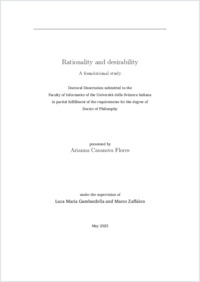Rationality and desirability : a foundational study
- Casanova Flores, Arianna
- Gambardella, Luca Maria (Degree supervisor)
- Zaffalon, Marco (Degree supervisor)
- 2023
PhD: Università della Svizzera italiana
English
The past century witnessed significant achievements in classical scientific fields like decision theory, social choice theory, and Bayesian probability, all rooted in the common principle of coherence as a foundation for rationality, i.e., in order to be rational, a calculus needs to deliver coherent inferences, or a subject needs to maintain coherent preferences among options. Bayesian probability is the arena where this idea has been faced more vividly, starting with the work of de Finetti. He clearly saw that rationality, in the mentioned interpretation of coherence, and probability, were just the same thing. Another arena where coherence has been identified with a science field is logic: coherence indeed is the subject matter of logic. A turning point in the interplay of logic, probability, and coherence, has been Peter Williams’ definition of desirability, an extension of de Finetti’s theory of probability made to deal with imprecision, as originated by incompleteness or other reasons. Desirability’s main tools, namely the coherent sets of desirable gambles, represent acceptable bets for rational agents adhering to specific axioms. These sets have connections to logic and probability, resembling closed theories and encompassing various generalizations of probability, such as lower and upper probabilities, convex sets of distributions, and more. Furthermore, recent research has expanded the application of desirability to decision-making, illustrating how coherent sets of desirable gambles align with traditional incomplete decision-making preferences. In my thesis, we delve deeper into the potential of desirability, pursuing three primary research lines. First, we propose desirability as a framework for aggregating opinions, thus unifying different forms of opinions based on coherence. This approach provides novel insights into traditional results and simplifies comparisons among different formalisms. Second, we examine the relationship between desirability and information algebras, revealing that desirability can be seen as an instance of these algebraic structures for inference. This insight presents a novel algebraic analysis of desirability and enriches it with the inference tools provided by these structures. Third, we explore relaxations of desirability’s foundational axioms to allow a more realistic interpretation of gambles. Specifically, we analyse different sets of axioms and we re-interpret them as binary (usually nonlinear) classification problems. Then, borrowing ideas from machine learning, we define feature mappings allowing us to reformulate the above nonlinear classification problems as linear ones in higher-dimensional spaces.
- Collections
- Language
-
- English
- Classification
- Computer science and technology
- License
-
License undefined
- Open access status
- green
- Identifiers
-
- NDP-USI 2023INF016
- ARK ark:/12658/srd1326570
- URN urn:nbn:ch:rero-006-121567
- Persistent URL
- https://n2t.net/ark:/12658/srd1326570
Statistics
Document views: 414
File downloads:
- 2023INF016: 270
